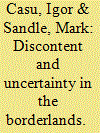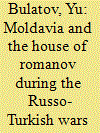| Srl | Item |
| 1 |
ID:
131156


|
|
|
|
|
| Publication |
2014.
|
| Summary/Abstract |
This article examines reactions to de-Stalinisation in Soviet Moldavia between February 1956 and March 1957. The article is based on evidence from the archives of both the former Communist Party of Moldavia and the Moldavian KGB. It highlights the uncertainty there was at local levels because of the denunciation of Stalin. Local party reports demonstrate concern about the activities of religious activists, Western propaganda, nationalism and disaffected youth. The Hungarian revolution of 1956 caused the party to change tack, and to begin a clampdown. These reports highlight that Soviet rule had very shallow roots in Moldavia.
|
|
|
|
|
|
|
|
|
|
|
|
|
|
|
|
| 2 |
ID:
044641


|
|
|
|
|
| Publication |
New York, John Wiley and Sons, Inc., 1964.
|
| Description |
xi, 451p.Hbk
|
|
|
|
|
|
|
|
|
|
|
|
Copies: C:1/I:0,R:0,Q:0
Circulation
| Accession# | Call# | Current Location | Status | Policy | Location |
| 000311 | 910.020947/LYD 000311 | Main | On Shelf | General | |
|
|
|
|
| 3 |
ID:
173283


|
|
|
|
|
| Summary/Abstract |
ONE of the most important events in the development of Russian-Moldavian relations took place in the early 18th century in Istanbul where Russian Ambassador and resident of the Russian intelligence in Istanbul Pyotr Tolstoy met Dimitrie Cantemir, member of the Moldavian intellectual elite. According to the report compiled by the Russian diplomatic mission in the Turkish capital, Dimitrie Cantemir, born in 1673, graduate of the Academy of the Patriarchate of Constantinople, was a son of the Moldavian Hospodar (ruler) Constantin Cantemir. As a teenager, he had been separated, according to the "Oriental etiquette" and contrary to his will, from his parents and sent to Istanbul as a hostage at the court of the Turkish sultan.
|
|
|
|
|
|
|
|
|
|
|
|
|
|
|
|